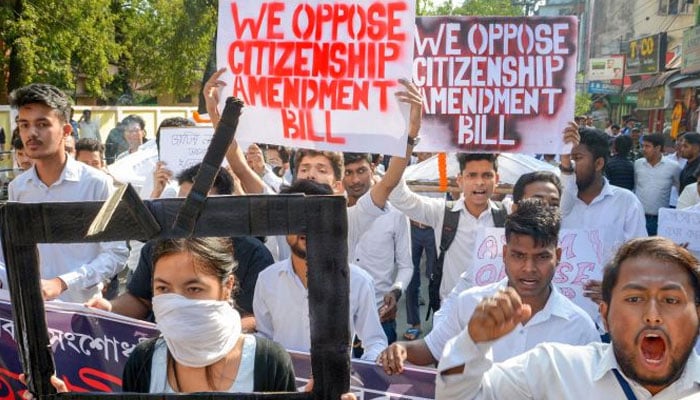Indian Parliament clears anti-Muslim bill
The Citizenship Amendment Bill (CAB) brings sweeping changes to India’s 64-year-old citizenship law by giving citizenship to "persecuted" minorities — Hindus, Sikhs, Buddhists, Jains, Parsis and Christians — from Bangladesh, Afghanistan and Pakistan.
NEW DELHI: India’s parliament Wednesday approved a controversial citizenship bill that grants citizenship to minorities facing persecution from three neighbouring countries — but excludes Muslims.
A day after clearing the lower house, the Citizenship Amendment Bill (CAB) was passed on Wednesday by the upper house (Rajya Sabha), with 125 members voting in its favour and 105 against it.
The bill brings sweeping changes to India’s 64-year-old citizenship law by giving citizenship to "persecuted" minorities — Hindus, Sikhs, Buddhists, Jains, Parsis and Christians — from Bangladesh, Afghanistan and Pakistan.
But critics say the legislation put forward by the Hindu nationalist ruling Bharatiya Janata Party (BJP) undermines the country’s secular constitution, with opposition parties, minority groups, academics and a US federal panel calling it discriminatory against Muslims.
"Muslim citizens of this country have no reason to worry," Amit Shah, the federal home minister, said in parliament. "This bill is intended to give citizenship, not take away citizenship."
Several opposition parliamentarians said the bill would be challenged in court. "The passage of the Citizenship Amendment Bill marks the victory of narrow-minded and bigoted forces over India's pluralism," said Sonia Gandhi, leader of the main opposition Congress party.
Meanwhile, Prime Minister Narendra Modi said it was a "landmark day for India" and the passage of the bill will "alleviate the suffering of many who faced persecution for years". Hundreds of troops were deployed in northeast India as demonstrators went on the rampage in protest against the new legislation.
Besides stoking concern among Muslims, the proposed changes have also ledto demonstrations in the northeastern states where residents are unhappy about an influx of Hindus from neighbouring Bangladesh who stand to gain citizenship under the CAB.
In a third day of protests in the far-flung region, several hundred troops were deployed in Tripura state and others were on standby in Assam, international media reported. Police fired teargas in different parts of Guwahati, Assam´s biggest city, as several thousand demonstrators attempted to barge past security barriers to converge on the adjoining state capital Dispur.
Tripura and parts of Assam suspended mobile internet services, with Assam wanting to avoid social media posts that could "inflame passions". Gatherings of more than four people were banned for 24 hours.
Derek O´Brien, an opposition lawmaker in the upper house, said the legislation bore an "eerie similarity" to Nazi laws in 1930s Germany. "In 1935 there were citizenship laws to protect people with German blood ... today we have a faulty bill that wants to define who true Indian citizens are," he said.
P Chidambaram from the opposition Congress party said the government was "wrecking and demolishing" India’s secular constitution to advance Modi’s "Hindutva agenda".
Modi’s government -- re-elected in May and under pressure over a slowing economy -- says Muslims from Afghanistan, Bangladesh and Pakistan are excluded from the legislation because they do not face discrimination in those countries.
Also left out are other minorities fleeing political or religious persecution elsewhere in the region such as Tamils from Sri Lanka, Rohingya from Myanmar and Tibetans from China.
Many Muslims in India say they have been made to feel like second-class citizens since Modi stormed to power in 2014. Several cities perceived to have Islamic-sounding names have been renamed, while some school textbooks have been altered to downplay Muslims’ contributions to India.
-
 Savannah Guthrie Shares Sweet Childhood Video With Missing Mom Nancy: Watch
Savannah Guthrie Shares Sweet Childhood Video With Missing Mom Nancy: Watch -
 Over $1.5 Million Raised To Support Van Der Beek's Family
Over $1.5 Million Raised To Support Van Der Beek's Family -
 Diana Once Used Salad Dressing As A Weapon Against Charles: Inside Their Fight From A Staffers Eyes
Diana Once Used Salad Dressing As A Weapon Against Charles: Inside Their Fight From A Staffers Eyes -
 Paul Anthony Kelly Opens Up On 'nervousness' Of Playing JFK Jr.
Paul Anthony Kelly Opens Up On 'nervousness' Of Playing JFK Jr. -
 Video Of Brad Pitt, Tom Cruise 'fighting' Over Epstein Shocks Hollywood Fans
Video Of Brad Pitt, Tom Cruise 'fighting' Over Epstein Shocks Hollywood Fans -
 Jelly Roll's Wife Bunnie Xo Talks About His Huge Weight Loss
Jelly Roll's Wife Bunnie Xo Talks About His Huge Weight Loss -
 Margot Robbie Reveals Why She Clicked So Fast With Jacob Elordi
Margot Robbie Reveals Why She Clicked So Fast With Jacob Elordi -
 Piers Morgan Praised By Ukrainian President Over 'principled Stance' On Winter Olympics Controversy
Piers Morgan Praised By Ukrainian President Over 'principled Stance' On Winter Olympics Controversy -
 Halsey's Fiance Avan Jogia Shares Rare Update On Wedding Planning
Halsey's Fiance Avan Jogia Shares Rare Update On Wedding Planning -
 Instagram Head Adam Mosseri Says Users Cannot Be Clinically Addicted To App
Instagram Head Adam Mosseri Says Users Cannot Be Clinically Addicted To App -
 James Van Der Beek Was Working On THIS Secret Project Before Death
James Van Der Beek Was Working On THIS Secret Project Before Death -
 Las Vegas Father Shoots Daughter's Boyfriend, Then Calls Police Himself
Las Vegas Father Shoots Daughter's Boyfriend, Then Calls Police Himself -
 'Hunger Games' Star Jena Malone Shocks Fans With Huge Announcement
'Hunger Games' Star Jena Malone Shocks Fans With Huge Announcement -
 Ex-OpenAI Researcher Quits Over ChatGPT Ads
Ex-OpenAI Researcher Quits Over ChatGPT Ads -
 Prince William Criticized Over Indirect Epstein Connection
Prince William Criticized Over Indirect Epstein Connection -
 'Finding Her Edge' Creator Explains Likeness Between Show And Jane Austin Novel
'Finding Her Edge' Creator Explains Likeness Between Show And Jane Austin Novel




